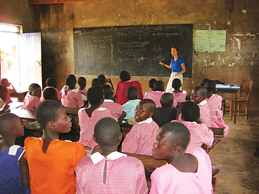Iowa State students improve lives of children in Uganda

Katie Taylor, senior in agronomy, instructs a class of Ugandan children. Taylor and other Iowa State students who participated in the Uganda Service-Learning Program this past summer taught the Ugandan children everything from math and science, to the importance of agriculture.
September 22, 2010
An eye-opening experience: building a chicken coop, planting hundreds of trees and sowing seeds in a garden, all the while surrounded by children eager to learn. Children who are starving not only for knowledge, but also for the food that will come from the chickens housed in the coop and the vegetables grown in the garden.
The Uganda Service-Learning Program
The poverty-stricken Kamuli District in Uganda was where seven ISU students and three faculty members found themselves for five weeks last summer. Surrounded by hundreds of children, the goal of the ISU visitors was to feed the children’s hunger to learn, both in and out of the classroom, in order to help them live better lives.
“We were there every day working with them,” said Katie Taylor, senior in agronomy. “Every time we’d go to the schools, the kids would just run out and yell their word for ‘white person.'”
Education
Partnering with students from Makerere University in Kampala, Uganda, ISU representatives taught children at two schools in the Kamuli District the subjects of math and science, along with the importance of agriculture.
Gail Nonnecke, ISU professor of horticulture, said teaching the importance of agriculture is essential, since the Ugandan teachers punish students who misbehave by sending them to the fields to work.
Due to this punishment, children do not think highly of agricultural work. Since many will become farmers when they are older, developing an understanding of agriculture in the youth is a must if the country is to prosper.
“It’s important for them to think well of agriculture as a livelihood and learning skills to take home to their family is important,” Nonnecke said.
School gardens
Some of the skills the children learn come from working in the school gardens. Starting from seedlings, the university students teach the children how to grow sweet potatoes, tomatoes, onions, carrots and banana trees.
The produce grown in the school gardens either goes home with the children or is used in the school lunch program. Designed to guarantee the children have at least one meal each day, the lunch program aims to lessen malnutrition rates in the district.
“Most just come to school to eat,” Taylor said of the children.
Nonnecke said Ugandan children normally only eat an 8-ounce glass of white maize porridge each day. The porridge contains 50 calories, the equivalent of a small apple. The school lunch program works to increase caloric intake in children to 100 calories per day. Adding beans to the porridge and having produce from the school gardens available for consumption helped them to achieve this goal.
Chicken production
Another source of food for the children comes from chicken eggs. Many of the Ugandan children suffer from protein deficiency, and the eggs help lessen that deficiency.
“It’s really important to teach the students about egg production,” said Brian Castro, sophomore in animal science.
Not only can the eggs be consumed, but they can also be sold at the market for a profit.
The ISU students worked to build a new chicken coop for the school, after the old one’s roof had been blown off. To prevent the coop from being damaged again, the students planted a windbreak around it, choosing trees that could also serve as a food source for the chickens.
Sustainability
A common theme for the work the university students did in Uganda centered on the topic of sustainability.
“All of the projects are intertwined,” said Sean Lundy, sophomore in global resource systems. “Everything ties into one another.”
Through teaching the children how to grow a garden and take care of chickens, the university students help promote agriculture and decrease malnutrition rates.
The work the university students performed started a chain of knowledge transfer: from university students to schoolchildren and their families. Children take the skills they learned at school home to their families to help grow a family garden, raise chickens to lay eggs and improve the overall quality of life for Ugandans.
“It’s important to work with the kids so they understand what’s going on,” Castro said.
The ISU representatives also taught the university students from Makerere University so they could continue educating the children from the Kamuli District once the five-week trip was over.
“Once we leave, they can still continue the projects and know how to do it,” Lundy said.
Though it is the students’ hope that their work will continue, the degree to which it will is unknown.
“We’re going to hope that it happens, but we don’t know if it will happen,” Taylor said.
Reflecting on time spent in Uganda
For the students, the Uganda Service-Learning Program opened their eyes to the reality of life in a developing nation.
“This definitely gave me a new perspective on this section of the world,” Taylor said.
The students said some people may see commercials advertising the need for help and support in poverty-stricken nations, but they sometimes do not realize just how much help those countries need. Actually going to the country and seeing the conditions the people are living in makes the television commercials more meaningful.
“It gives you the drive to go and do something about it,” Castro said.
The students recommend others become involved in the Uganda Service-Learning Program, not only because it is a great volunteer opportunity, but also because of the self-fulfillment students get for their efforts.
“They made as big of an impact on us as we made on them,” Lundy said of the Ugandans.
















